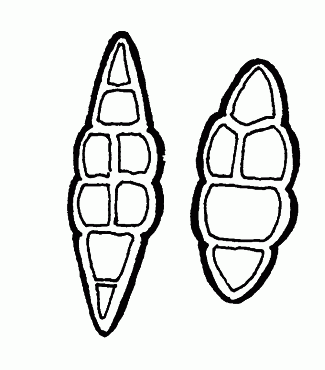Click on the image below to view an
expanded illustration for this species.

|
General:
Common Name: The Tarpaper Lichens. Stresses the blackish nonstratified medulla that becomes somewhat swollen, translucent and jellylike when moistened.
Minute to occasionally large nonstratified foliose lichens (gelatinous when wet), lacking true cortex, (except cortex present on apothecial margin: see below) isidiate or not, lobes closely appressed to semi-erect, 0.5–10 (–15) mm wide, thin to thick. Upper surface dark olive brownish or blackish (ours), dull. Lower surface dark, rhizines absent or rarely present. Medulla absent. Photobiont blue-green.
Apothecia located over upper surface or marginal, with thalline margin, disc reddish brown; spores 2- to multicelled, ellipsoid to needle-shaped/acicular, (4–) 8 per ascus. Over bark, earth and rock, usually base-rich.
Notes: Collema is a taxonomically difficult genus comprising about 80 species, of which 35 are known to occur in North America and 20 in B.C. Chemistry is of no diagnostic value in this genus. Two keys are provided. The first key emphasizes macroscopic vegetative characters, though spore characters have been incorporated in some places. The second key, to nonisidiate species, stresses spore characters and is more technical.
Species description:
Lobe margins hairless; isidia, if present, also lacking hairs AND
Thallus foliose or, if somewhat fruticose, then lobes proportionally much shorter and broader; habitat and distribution various AND
Lobes brownish to olive-brownish or blackish, but never jet black above and below; rarely pruinose; habit, substrate and distribution various AND
Isidia absent or, if present, then either essentially globular throughout or becoming cylindrical or branched/coralloid at maturity; scalelike lobules absent (or sparse in some specimens of C. furfuraceum) over upper surface AND
Lobe thickness uniform throughout, lobe tips scarcely (if at all) more swollen than central portions of thallus; upper surface sharply and finely wrinkled or not; central portions of thallus dull (except occasionally shiny in C. nigrescens) AND
Upper surface lacking isidia (Note: nonconstricted, isidia-like lobules may occur along margins in some species) AND
Over rock; upper surface not blistered/pustulate AND
Not associated with intertidal zone; apothecia present or absent AND
Thallus crust-like, minute, usually less than 0.5 cm across; lobes averaging to less than 0.3 mm; spores submuriform (i.e., with both transverse and longitudinal septa), (20–) 26–38 (–45) x (9–) 12–15 m; rare
Comments:
Only var. rhyparodes (Nyl.) Degel. is reported from B.C. The record comes from Yoho National Park and represents the only report of this variety for North America.
Source: Lichens of British Columbia |